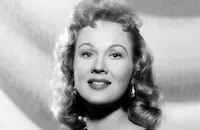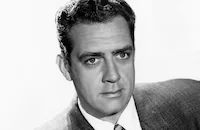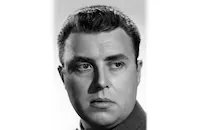Great Day in the Morning

Brief Synopsis
Cast & Crew
Jacques Tourneur
Virginia Mayo
Robert Stack
Ruth Roman
Alex Nicol
Raymond Burr
Film Details
Technical Specs

Synopsis
Outside Denver, Colorado in 1861, Owen Pentecost is engaged in a battle with a band of Indians when Steven Kirby comes to his aid. Owen follows Steven to his camp, where he learns Steven is leading Easterner Ann Alaine into Denver, where she plans to set up a dress shop. Hired hand Zeff Masterson berates Owen for his Southern, and assumedly Confederate, background, until Ann stops the men from fighting and invites Owen along with them. They soon enter Denver, where Father Murphy encourages them to attend church. They procure rooms at the saloon owned by Jumbo Means, where the men loudly admire Ann's figure while bar manager Boston Grant admires Owen. As Owen gambles inside, outside Zeff beats a man for claiming that Northerners and Southerners are "brothers." Upon learning that Owen is winning, Jumbo challenges him to a poker game, during which Owen publicly proves that Jumbo is cheating. After changing decks, Owen wins all Jumbo's money, until the saloon owner is forced to put up all his assets as collateral. Although Jumbo expects Boston to help him cheat, she instead cheats in Owen's favor. She later tells Owen, who is now drunk, that Jumbo treated her poorly, and looks the other way when Owen flirts with Ann before passing out. The next day, Owen visits the handful of Southern townsmen, led by Rogers, who operate a gold mine nearby. After telling them that he has learned from a friend back home that they are hiding millions in gold, Owen offers them the use of the saloon's weapons and wagons, in exchange for a percentage of the gold. Rogers, who plans to give the gold to the Confederate Army, is horrified by Owen's mercenary ways, but is forced to agree. Later, Boston shows Owen Jumbo's mining claims that he now owns, after which Owen announces to the town that he will stake any claim in return for half the profits. As the men swarm to the mines, Owen, bearing champagne, visits Ann's new shop. Although she receives him coldly, Steven finds them together and guesses, jealously, that Ann is intrigued by Owen. Steven, who is really a Secret Service agent for the Union Army assigned to keep the Southerners from transporting their gold, visits his superior, Col. Gibson, who orders him to remain discreet. A few days later, Owen visits Jack Lawford at his new mine claim, and upon spotting Lawford burying some gold, accuses him of refusing to pay his fifty percent. As Ann watches, Lawford draws his gun, forcing Owen to kill him. They bring the body back to town, where Jumbo leads the townsmen in a revolt against Owen, but Ann saves him by asserting that they found Lawford already dead. The next day, when Lawford's young son Gary arrives in town looking for his father, only to learn that he has been orphaned, Owen takes the boy in. Despite her disgust with Owen's actions, Ann helps him, earning Boston's enmity. Over the next weeks, Owen takes Gary under his wing, teaching him everything he knows and sharing his father's gold. One day, Gary asks Owen to teach him sharpshooting skills so he can track down his father's killer. When Owen consents, Ann is outraged by what she considers his barbarism, prompting Steven's jealousy at her continued interest in Owen. She confronts Owen, declaring that when Gary learns the truth, he will be crushed, but Owen correctly surmises that her passion hides an attraction. He kisses her until she returns the embrace, then leaves. Soon after, the Civil War begins. When Fort Sumter falls, the Unionists march in the streets of Denver, and the Southerners gather in the saloon. There, Owen refuses to join them, but is forced to defend himself when Zeff leads an ambush into the saloon. Gary tries to join the men, and when Owen attempts to rescue the boy, he is shot. The shootout ceases only after Father Murphy is accidentally killed. Ann and Boston minister to Owen until Boston calls Ann outside to berate her being incapable of loving Owen unless she can change him. Later, the Easterners gather in Jumbo's new saloon, where Steven names Zeff a sergeant and swears them all in as Union soldiers. Soon, the Southerners move the gold into Owen's warehouse, which Gibson surrounds with his soldiers. Owen is unsure whether to join the Southerners until his bartender declares that he cannot turn his back on his own kind. While Owen packs to leave, both Boston and Gary insist on accompanying him, but to keep Gary out of danger, Owen reveals that he shot his father. Gary runs into the street, followed by Boston, who knows she must stay behind to care for the boy. Owen agrees to lead the Southerners out of the warehouse, but demands $100,000 in payment. Meanwhile, Jumbo tricks Boston into entering his saloon, where he kills her in a jealous rage. As he lays her body in front of the saloon, he is killed in the crossfire between the soldiers and the Southerners, who escape from the warehouse in a blaze of explosives. Zeff's men chase the wagon train while Steven takes his men to cut them off on the trail. There, Owen empties one wagon of gold and drives it into the hills, guessing correctly that the soldiers will follow him. As the other wagons escape, Owen jumps out of the speeding wagon and hides in a cave. Steven traces him there and is about to kill him when Owen admits that he and Ann are not right for each other, and that he loves only Gary and Boston, unaware that she is dead. After Owen asks Steven to tell Boston to meet him in the South, Steven allows Owen to leave. The two men salute each other before joining their separate forces.

Director

Jacques Tourneur
Cast

Virginia Mayo

Robert Stack

Ruth Roman

Alex Nicol

Raymond Burr
Leo Gordon

Regis Toomey
Carlton Young
Donald Macdonald

Peter Whitney

Dan White
Crew
Constantin Bakaleinikoff
Cliff Broughton
John E. Burch
Larry Butterworth
James Casey
Albert S. D'agostino
Walter Elliott
Edmund Grainger
Edmund Grainger
John C. Grubb
Terry Kellum
Annabell Levy
Harry Marker
Jack Okey
Lesser Samuels
William Snyder
Leith Stevens
Gwen Wakeling

Film Details
Technical Specs

Articles
Great Day in the Morning
Great Day in the Morning (1956), directed by Jacques Tourneur (Cat People [1942], Out of the Past [1947]), is, in the words of Chris Fujiwara, author of Jacques Tourneur: The Cinema of Nightfall, "perhaps the most puzzling and disturbing item in Tourneur's filmography." It is certainly the most cerebral and complex of his movies, and one of the rare westerns which focuses less on gunplay than moral and ethical considerations facing the main characters. The protagonist, Owen Pentecost, is a true anti-hero, a man of cunning determination and ruthless ambition whose real motives and beliefs remain unclear, even to himself at times. As the film progresses, it becomes less about the tumultuous events and uneasy alliances that occur in this frontier town and more about how they affect Pentecost, forcing him to examine his own conscience. [Spoiler Alert] In the end, after numerous betrayals and shootings, Pentecost finds redemption in proclaiming his allegiance to the South and admitting his love for Boston. But his moment of self-realization has come too late. Pentecost doesn't realize Boston was murdered by Means after he deserted her in Denver and his newfound commitment to the Confederate cause is doomed. It's a bitterly ironic ending that prefigures such introspective and melancholy westerns as Robert Altman's McCabe and Mrs. Miller (1971) and Sam Peckinpah's Pat Garrett and Billy the Kid (1973).
For a film brimming with violence, emotional upheavals and desperate situations, Great Day in the Morning is surprisingly undramatic. This is partly due to the stylized performances and theatrical staging but the underlying suspense is actually generated through the film's brilliant cinematography (by William Snyder) which uses color and varying shades of dark and light to reveal aspects of the characters and their relationships not readily evident from the dialogue. The sequence where Means lures Boston into a darkened saloon to kill her is a particularly powerful moment, as evocative in its own way as the scene from Tourneur's Cat People when an unseen presence threatens Jane Randolph in the swimming pool or Curse of the Demon (1957) when Dana Andrews takes an ill-advised short cut through a dark woods.
Typical of the type of review Great Day in the Morning received upon its release is this quote from Variety which pegged it as B-movie drive-in fodder: "...sufficient to fit the not-too-demanding requirements of the general outdoor market...unfolds at a regulation, but not always fast, pace." It wasn't a hit with audiences either and is generally overlooked in the western genre by most film reference books such as Halliwell's Film & Video Guide, which has labeled it a "solemn semi-Western without much excitement." Maybe you have to be a Jacques Tourneur fan to appreciate Great Day in the Morning and see it as the bleak and despairing morality play it was obviously intended to be.
Producer: Edmund Grainger
Director: Jacques Tourneur
Screenplay: Lesser Samuels, Robert Hardy Andrews (novel)
Cinematography: William Snyder
Film Editing: Harry Marker
Art Direction: Jack Okey
Music: Leith Stevens
Cast: Virginia Mayo (Ann Merry Alaine), Robert Stack (Owen Pentecost), Ruth Roman (Boston Grant), Alex Nicol (Captain Stephen Kirby), Raymond Burr (Jumbo Means), Leo Gordon (Zeff Masterson).
C-92m. Letterboxed.
by Jeff Stafford

Great Day in the Morning
Virginia Mayo (1920-2005)
She was born Virginia Clara Jones in St. Louis, Missouri on November 30, 1920, and got her show business start at the age of six by enrolling in her aunt's School of Dramatic Expression. While still in her teens, she joined the nightclub circuit, and after paying her dues for a few years traveling across the country, she eventually caught the eye of movie mogul Samuel Goldwyn. He gave her a small role in her first film, starring future husband, Michael O'Shea, in Jack London (1943). She then received minor billing as a "Goldwyn Girl," in the Danny Kaye farce, Up In Arms (1944). Almost immediately, Goldwyn saw her natural movement, comfort and ease in front of the camera, and in just her fourth film, she landed a plumb lead opposite Bob Hope in The Princess and the Pirate (1944). She proved a hit with moviegoers, and her next two films would be with her most frequent leading man, Danny Kaye: Wonder Man (1945), and The Kid from Brooklyn (1946). Both films were big hits, and the chemistry between Mayo and Kaye - the classy, reserved blonde beauty clashing with the hyperactive clown - was surprisingly successful.
Mayo did make a brief break from light comedy, and gave a good performance as Dana Andrews' unfaithful wife, Marie, in the popular post-war drama, The Best Years of Their Lives (1946); but despite the good reviews, she was back with Kaye in The Secret Life of Walter Mitty (1947), and A Song Is Born (1948).
It wasn't until the following year that Mayo got the chance to sink her teeth into a meaty role. That film, White Heat (1949), and her role, as Cody Jarrett's (James Cagney) sluttish, conniving wife, Verna, is memorable for the sheer ruthlessness of her performance. Remember, it was Verna who shot Cody¿s mother in the back, and yet when Cody confronts her after he escapes from prison to exact revenge for her death, Verna effectively places the blame on Big Ed (Steve Cochran):
Verna: I can't tell you Cody!
Cody: Tell me!
Verna: Ed...he shot her in the back!!!
Critics and fans purred over the newfound versatility, yet strangely, she never found a part as juicy as Verna again. Her next film, with Cagney, The West Point Story (1950), was a pleasant enough musical; but her role as Lady Wellesley in Captain Horatio Hornblower R.N. (1951), co-starring Gregory Peck, was merely decorative; that of a burlesque queen attempting to earn a university degree in the gormless comedy, She¿s Working Her Way Through College (1952); and worst of all, the Biblical bomb, The Silver Chalice (1954) which was, incidentally, Paul Newman's film debut, and is a film he still derides as the worst of his career.
Realizing that her future in movies was slowing down, she turned to the supper club circuit in the 60s with her husband, Michael O'Shea, touring the country in such productions as No, No Nanette, Barefoot in the Park, Hello Dolly, and Butterflies Are Free. Like most performers who had outdistanced their glory days with the film industry, Mayo turned to television for the next two decades, appearing in such shows as Night Gallery, Police Story, Murder She Wrote, and Remington Steele. She even earned a recurring role in the short-lived NBC soap opera, Santa Barbara (1984-85), playing an aging hoofer named "Peaches DeLight." Mayo was married to O'Shea from 1947 until his death in 1973. She is survived by their daughter, Mary Johnston; and three grandsons.
by Michael T. Toole
Virginia Mayo (1920-2005)
Quotes
Trivia
Notes
A written prologue states that in Colorado, the white man first fought the Indians for possession of the land and then turned on his fellow white man. According to a February 24, 1955 Los Angeles Examiner news item, producer Edmund Grainger originally approached Richard Burton to play "Owen Pentecost." In March 1955, Los Angeles Times reported that Grainger was considering either William Powell or Robert Mitchum to play Owen, Joe E. Brown to play "Father Murphy" and Shelley Winters and Grace Kelly for the female leads. Grainger borrowed Virginia Mayo from Warner Bros. for the film.
Press materials state that Great Day in the Morning was shot mainly on location in Silverton, CO. Although August 1955 Hollywood Reporter news items add George Wallace and Dorothy Bewley to the cast, and a September 1955 Hollywood Reporter production chart includes actor Scott Douglas, their appearance in the final film has not been confirmed. According to a April 13, 1956 Hollywood Reporter news item, the Denver & Rio Grande Railroad offered special excursion rates to Denver in order to attend the film's premiere on May 16, 1956. Modern sources add Lane Chandler, Ben Corbett, Dennis Moore and Kermit Maynard to the cast.

Miscellaneous Notes
Released in United States May 1956
Released in United States Spring May 16, 1956
SuperScope
Released in United States May 1956
Released in United States Spring May 16, 1956














